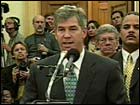|
Enron: Fastow takes Fifth
|
 |
February 7, 2002: 2:23 p.m. ET
Three others refuse to answer questions but ex-CEO Skilling testifies.
By Staff Writer Luisa Beltran
|
NEW YORK (CNN/Money) - As expected, Andrew Fastow, Enron Corp.'s ousted chief financial officer, invoked his constitutional right against self-incrimination Thursday as congressional hearings resumed into the collapse of what was once America's seventh-biggest company.
Fastow, who was subpoenaed, cited the Fifth Amendment as he refused to answer questions posed by Rep. James Greenwood, R-Pa., who heads the Oversight and Investigations Subcommittee of the House Energy and Commerce Committee.
Fastow, who was the first former Enron executive to appear Thursday, has been called the chief architect of partnerships that helped hide Enron debts and ultimately led to a restatement of earnings that caused investors, customers and trading partners to lose confidence in the company, which filed the biggest bankruptcy in U.S. history on Dec. 2.
A recent report from independent directors of Enron said Fastow made $30 million for himself from these partnerships. Fastow was ousted as CFO by Enron on Oct. 24 of last year, and was succeeded by Jeff McMahon, who then became chief operating officer of Enron just last week.
In his testimony Thursday afternoon, McMahon described a March 16, 2000, meeting with former CEO Jeff Skilling, in which he detailed several concerns about conflicts surrounding the special purpose entities (SPEs) created to move assets and debts off Enron's books.
In many cases, McMahon said, he was forced to negotiate with Fastow, his own boss, about deals concerning Enron and these SPEs that he didn't think were in the interest of Enron shareholders.
"My integrity forces me to negotiate the way I believe is correct," McMahon said in the "talking points" he prepared before his meeting with Skilling. "In order to continue to do this, I must have support from you [Skilling]."
McMahon, who was Enron's treasurer at the time, said Skilling had little reaction to the discussion.
"His parting words to me were that he understood my concerns and would remedy the situation," McMahon said.
But the situation was not remedied, McMahon said, and soon Fastow suggested the two men couldn't work together any more. Shortly after that, Skilling suggested McMahon change jobs within Enron, and he lost track of LJM.
"Maybe naively, at the time I certainly believed Skilling when he said he thought I'd be better using my skill sets elsewhere, at a new startup group related to e-commerce."
McMahon also said he was aware of a letter and memorandum written a year later by Sherron Watkins to former CEO Kenneth Lay detailing her concerns about the company's finances. McMahon, who had known Watkins for many years, said he vouched for her credibility to Lay. He said he read the letter but had not seen the memo.
McMahon admitted that he sold $1.8 million of Enron stock on the day of his March 2000 meeting with Skilling, but said that was part of a periodic adjustment of his portfolio balance and had nothing to do with his concerns about the SPEs.
"I didn't feel uneasy about Enron stock at that time," McMahon said. My concerns were about the internal management of a conflict. I didn't see it as a large issue from a stock-price perspective."
The lawmaker questioning him pointed out that Fastow and Clifford Baxter - who died in January of an apparent suicide - also sold substantial amounts of Enron stock during that period.
Three other witnesses - Michael Kopper, Richard Causey and Richard Buy - followed Fastow's example and invoked their constitutional rights against self-incrimination.
Kopper is a former Enron officer who worked for Fastow; Causey was Enron's chief accounting officer; and Buy, Enron's chief risk officer, oversaw Enron's investment portfolio.
Two other witnesses, both members of the Enron board, testified that there were breakdowns in "control systems" and that people in management did not tell them the truth.
"The management on whom we relied to tell the truth did not do so," said one of the witnesses, Herbert Winokur, chairman of the board's finance committee. When pressed by Rep. Billy Tauzen, R-La., whether Skilling had told the truth, Winokur added that Skilling "did not lie to us."
Robert Jaedicke, chairman of the board's audit and compliance committee, said a series of safety mechanisms implemented in February 2001 broke down.
"The controls the board put in place to monitor these transactions broke down," Jaedicke said. "If even some of the controls had worked, we could have avoided this terrible tragedy."
But Rep. Chris John, R-La., chided the two board members for not having a better handle on what was happening at the company. He mentioned in his criticism their $300,000-a-year salary for serving on the board.
"The board has a responsibility," John said. "You can only say, 'They didn't tell us,' so far. You were paid $300,000 a year and you didn't know? That's just amazing."
Enron General Counsel Jordan Mintz testified earlier in the session that he had tried to make the company aware of his concerns about the partnerships. He said he asked an outside law firm, Fried Frank Harris Shriver & Jacobson, to look into the legality. The law firm recommended that Enron halt how it was handling the partnerships. 
|
|
|
|
|
|

|

